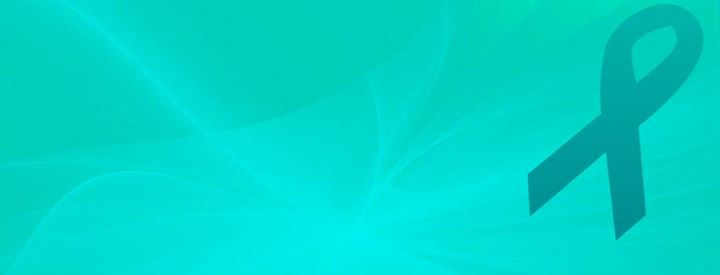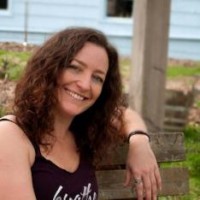Editor’s Note: This website is not designed to, and should not be construed to, provide medical advice, professional diagnosis, opinion or treatment to you or any other individual, and is not intended as a substitute for medical or professional care and treatment.
.
September is Ovarian Cancer Awareness Month, but we should all—men and women alike—be aware every month, every week and every day of everything that’s happening in our fascinating bodies.
As we know, cancer isn’t picky. Sure lifestyle, genetics, toxic exposure and viruses can have an effect, but cancer doesn’t care how well you eat, how much you exercise, how much money you have, who your parents are—if you’re black or white or gay or straight or married or single or young or old—cancer is not picky. Which is why information is crucial.
I was 29 when I was diagnosed with ovarian cancer.
I was well educated, thin, fit, strong and active with a good diet, a great relationship, an amazing 6-year-old daughter, supportive friends and family, fulfilling work as a midwife and an artist; I had a garden, an active social life and even a dog that fetched—all the makings of a healthy, happy life. I also had a tumor the size of a large grapefruit growing in my body.
In 1996, I didn’t have the same access to information as women do now, but I did do all the research I could. I read a statistic that said that ovarian cancer kills 65 percent of the women afflicted with it within the first five years. It sounded terrifying. “Sixty-five percent die” didn’t work for me, so I told myself that 35 percent live, and I would damn well be one of them.
My first symptoms were pain during intercourse and general constant cramping. I have a high pain tolerance, so I ignored it for several months. For a long time I figured I had a cyst, and it would resolve on its own. Eventually, when a constant nagging feeling followed me everywhere, and I started feeling about four months pregnant, I saw a doctor—a man—one who would’ve killed me had I listened to him.
I was in a fair amount of pain lying back on the exam table, my feet in the stirrups with a young, arrogant doctor digging around inside me while he said in a cold voice, “I don’t feel anything in here, I think it’s psychological—you should see a therapist, not a physician.”
He suggested that most women have “issues” about turning 30. Maybe it was that?
Maybe I wasn’t satisfied with my sex life, so I was manifesting pain to avoid intimacy. Did I really love my partner? Maybe we needed counselling. Maybe it was a failure to climax. Maybe I had PMS or anxiety.
To make a long and very frustrating story short, I listened to my instincts, saw someone else and within two weeks was in surgery.
Ovarian cancer is sneaky, but there are symptoms.
Bowel changes. When a growth puts pressure on the bowel, it can cause a variety of changes: constipation, diarrhea, hemorrhoids, small bowel movements or blood in stool. Even with an 11 cm tumor, I did not experience these changes.
Frequent gas or bloating. Again, the pressure of the growth can cause digestive upset. I did have this symptom. Every single day. I noticed that it didn’t matter what I ate. I felt gassy and bloated continuously.
Painful intercourse or orgasm. Tumors get in the way plain and simple. They put pressure on nerves and other organs. To me it felt like severe cramping every time I had an orgasm, even an orgasm not associated with intercourse. Just like an orgasm builds up and peaks, the pain did the same thing. Intercourse even without orgasm was also uncomfortable—a bruised, pinchy sort of feeling. It got to the point that I was avoiding all physical intimacy for fear of hurting for the following two or three hours.
Frequent urination. I peed constantly. This was a primary symptom for me. When I wasn’t in the act of peeing I felt like I wanted to be. The tumor pressed directly on my urinary tract. I would stand up from the toilet, bounce and wiggle around a bit to move things around and sit back down to pee again.
Low back pain. I had persistent low back pain for months preceding diagnosis.
Feeling full after eating very little. Just like in pregnancy, tumors take up space and make us feel more full after eating very little food. It happened slowly, and I didn’t have a big appetite to begin with, so it took me a while to notice this as a symptom, but while that tumor was large in me, I ate very little.
Weight loss. I was thin to begin with, but over the course of six months, I went from 125 pounds to 110.
Cramping. I constantly felt like my period would start any minute. My period was never a day late and was normal in flow. I never experienced any cycle changes or unusual bleeding, but I did constantly feel crampy.
Ovarian cancer is getting much easier to diagnose.
Ovarian cancer is easy to see on a transvaginal ultrasound, and the test is quick, easy and not terribly uncomfortable. A wand, not much bigger than a penis, is inserted into the vagina to image the ovaries and surrounding tissues. The test is done slowly and hopefully gently. It takes only minutes, and while there is a little pressure, it is not painful. A skilled doctor or technician can tell instantly if a growth appears fluid or solid.
A blood test looking for particular cancer antigens called a CA-125 is one testing method, although my CA-125 was never elevated. It is the same today as it was when I had a tumor. It is a more effective diagnostic tool in more advanced cancers that have spread. Certain other health conditions can also cause an elevated test result. This was not a good diagnostic tool for me, but certainly might be for others.
The survival rate for women with ovarian cancer continues to increase with improved treatment, but more so with early detection. Knowing your family history is helpful, but listening to your body and being aware of changes are truly the most useful tools in early detection.
My family carries a genetic cancer marker. I was born with increased risk factors, so I educate myself well and make lifestyle choices that will hopefully keep me alive to see my great-great-grandchildren. I exercise, eat well, don’t smoke, surround myself with joyful loving people, have a life full of purpose, minimize stress and drama and I live my life every day as if I am grateful to be alive, because I am.
Ovarian cancer is a sneaky bitch, but I knew the symptoms, listened to my gut and did not take no for an answer.
If you or someone you care about is experiencing ongoing symptoms please ask your doctor for an ultrasound. Ovarian cancer is not just an old woman’s disease. Cancer is not picky.
.
**References:
Ovarian Cancer National Alliance.
U.S. Department of Health & Human Services, National Institutes of Health.
Relephant:
Dear Cancer: A Letter to My Ex.
.
Author: Kimby Maxson
Editor: Yoli Ramazzina
Photo: Flickr/TraumaAndDissociation
 Share on bsky
Share on bsky


Read 0 comments and reply